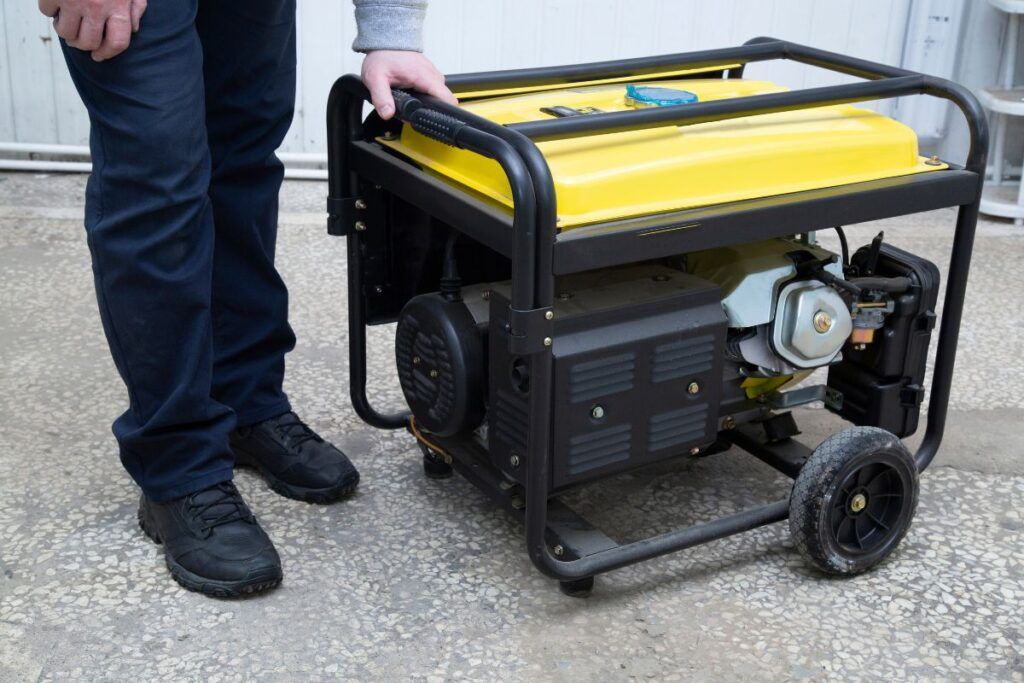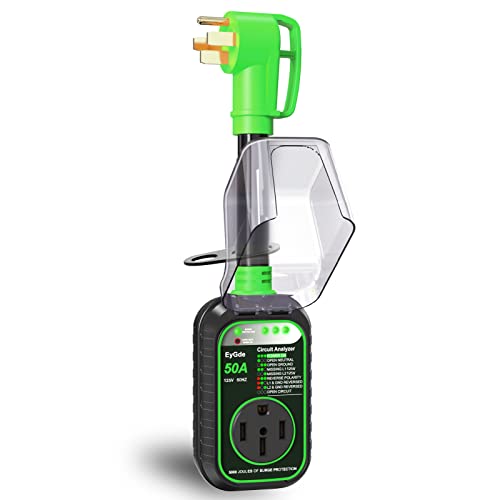Surge protectors are essential for all average homes. It helps to protect your house appliances and sensitive electronic devices from sudden voltage spikes and surges. But what if you have a generator? Can you still use the surge protector with your generator?
You must always use a surge protector to safeguard your house’s electrical gadgets. But whether you really need it or not depends on the generator type. Portable and conventional generators are prone to surges. If you have them, you must use a surge protector for safety.
If you are confused about whether to use a surge protector while having a generator, this article is all you need. We will cover information about the importance of surge protectors, the benefits of using them with generators, the type of surge protector to use with generators, and much more.

Check out our list of top-handpicked products for all your electrical, appliance, and HVAC system needs to keep your home running smoothly.
This post includes some affiliate links.Understanding surges
Before we talk about surge protectors, let’s talk about surges.
As I began working on my DIY electrical projects, I was curious about the causes of power surges.
Most houses are vulnerable to several electrical threats like brownouts and spikes. Spikes are also called a surge.
But I found them to be different from each other.
A spike happens when the voltage increases suddenly and forces the household equipment to contend with dangerous amounts of voltage.
Spikes occur due to lightning and malfunctions in the utility pole.
But in surges, powerful appliances draw the maximum power from the grid.
This excess power is distributed through the power lines when appliances are off.
As a result, a temporary voltage increase occurs.
In most cases, this temporary increase stays for a few microseconds.
But it is enough to harm the sensitive devices.
That is why the experts suggest using surge protectors.
Surge protectors will stop the excess current from flowing through the power lines, and divert it to flow through the ground wires, thus saving your devices.
The importance of Surge Protection: Understanding the need for a surge protector with your generator
A surge protector, also called a spike protector, is an electrical device that helps to protect electrical appliances from voltage spikes.
The primary function of the surge protector is to prevent the transient voltage over 330V from reaching your generator and the connected electrical appliances and damaging them.
The voltage stays from 1 to 30 microseconds, enough to damage your house equipment.
The surge protector will divert the excess current to the ground wire.
It contains a metal oxide varistor that changes the resistance based on the voltage.
When you use the surge protector with your generator, the power surge cannot reach your electronic appliances and the generator, thus saving them from damage.
A surge protector can wear off as the varistor (the main component) turns the excess current into heat and, over time, will provide less protection.
Usually, a surge protector lasts 3-5 years but depends on the frequency of surges.
I have been using a surge protector for 3 years, and it still runs fine.
Can you use a surge protector with a generator?
When the question is about using surge protection with your house’s generator, it can be confusing.
Generally, it is always recommended to use a surge protector, even if you have a generator.
But it depends on the generator type whether you need it or not.
You do not require surge protectors for inverter generators because the inverters are already surge protected.
The inverter generator uses a complicated technique to convert the alternating current (AC) that was generated to direct current (DC) first to convert it back to a stable alternating current (AC).
In this output, you will get high-fluctuating AC power turned into clean AC electricity free from sudden surges.
However, surges are common if you have conventional generators like mine or portable generators.
Without surge protectors, you risk the appliances.
Therefore, you must plug a surge protector between the generator and the consumers.
A standby generator is not affected by the external devices causing power surges.
So, there are rarely any chances of power spikes occurring.
But you should still protect your equipment with surge protectors.
Peace of mind: How do surge protectors provide added security and reliability
The average generators come with a standard 120V electrical outlet.
When you plug the surge protector into an ordinary outlet, you can do the same with your generator’s 120V outlet.
Generators are considered reliable backups of power and ensure uninterrupted power supply during emergencies and areas with limited access to the power grid.
But they are also dangerous products.
They are loud and release toxic fumes, for which they are kept outside.
When it brings power to the appliances, plug a surge protector directly into the generator.
For the safety of the appliances, add an outdoor extension cord.
They are attractive, stay insulated against problematic elements, and are also available in higher gauges.
These extensions have 3 prongs (one for ground) that defend against electrocutions, short circuits, and fire hazards.
An extension cord can extend the generator’s outlet into your house, and you can attach the surge protector.
Power surges are like unexpected guests that cause excessive voltage and harm sensitive appliances.
So, protecting them is essential to avoid costly repairs and extend their lifespan.
With these surge protectors, you can eliminate the risk of power surges and appliance damage.
You will have peace of mind since you have a surge protector to protect the appliances from sudden power surges.
Choosing the suitable surge protector: Factors to consider when selecting a surge protector

The house generators are directly linked to the house’s electrical system so that the surge protectors can get linked to the entire system.
There are two defense lines that house owners use to protect their houses from surges:
- The surge arresters on the main electrical panel of your house.
- The surge suppressors at the outlets or power strips where you plug electrical appliances.
Some ideal brands are Siemens, Eaton, and Leviton.
These brands provide you with surge arrestors for electrical panels to stop power surges of all types.
You can relax knowing these effective surge protectors protect your electrical appliances and generators during a power surge.
Surge suppressors are installed inside the house and are a barrier between electricity and electronic devices.
Set them up in areas with electronics sensitive to power surges and plug the items like laptops, computers, mobiles, TVs, and gaming consoles into the suppressor.
With a 2-phase approach, you can improve the surge protection of your house.
You will not notice the effects on your house’s electronics when the surges occur.
When excessive voltage is released due to sudden power surges, the equipment will stay protected when the generator or main power is on.
While buying surge protectors for your generators, there are a few things you need to consider:
Clamping voltage
The clamping voltage means the amount of voltage that causes a surge protector to do its job of transferring the extra current to the ground wire.
When the clamping voltage is low, the surge protector’s mechanisms will be active, respond faster, and provide better protection.
Lights
A good surge protector should have indicator lights to show its lifespan.
The best protectors will let you know when they encounter a surge and suffer damage.
It will allow you to replace the surge protector before the next surge occurs.
Joule rating
Check the joule rating without fail to know the energy quantity your surge protector can absorb before it stops working.
You must pick up the surge protector with the highest joule rating, as it will translate into a more potent surge protector and stay in operation for a long time.
UL rating
Since it is a matter of electricity, use reliable surge protectors.
When a product claims to be UL-rated, the product is tested by independent laboratories and given a UL rating.
It means the product is safe to use and of good quality.
Do not use surge protectors that do not have any UL rating.
After some good research, I found Yodetek 25Ft Generator Cord with Surge Protector Breaker, Heavy Duty Generator Locking Cord, NEMA L14-30P/Four 5-20R, 4 Prong 10 Gauge Flexible Cable, Power Extension Cord, 30Amp 7500 Watts to be the best one for my generator.
It suits best for the RV generator and portable generator. It will cost around $66.
Surge protector type
Several Surge protector types exist, like power strips, surge suppressors, surge arrestors, and Uninterruptible Power Supplies (USP).
The power strips do not have surge protection but only add more outlets to your house.
Surge suppressors and arresters protect the applianced from power surges. The USPs provide the backup power.
You need a surge suppressor for your generator that can tolerate the power of a complete home generator.
Number of outlets
Consider the number of outlets your generator needs.
Ensure you have enough outlets on the surge protector for all the devices you intend to connect and save.
Cord length
The cord length of the surge protector.
It should be able to extend from the generator to wherever you need to plug in your electronic appliances by measuring the cord length.
Brand
Surge protectors are not equal based on the brand.
Several brands have different reputations for different qualities.
Choose the reputed one with a track record of manufacturing trustworthy products, especially UL-rated.
Recommended surge protectors for generators
Here are a few best surge protectors for the generators suggested by most professionals:
- Yodotek 25Ft Generator Cord with Surge Protector Breaker ($66)
- Surge Guard 44261 Entry Level 30 Amp Portable RV Surge Protector ($104)
- Champion 25-Foot 30-Amp Volt Generator Power Cord for Manual Transfer Switch (L14-30P to L14-30R) ($67)
Can generators cause surges?

Surge protectors are needed when there is a sudden power surge.
But do generators create power surges?
I also had these questions when I was told to add surge protectors for my generator.
It is uncommon for the generator to have power surges, but it can occur with a malfunctioning system.
The generator’s engine will run inefficiently due to old age, fuel problems, poor maintenance, unbalanced load, erratic motors, intermittent AVR failure, or faulty plugs.
Due to this inefficiency, the power will fluctuate, and the generator will produce power surges.
Whether your generator needs a surge protector or not also depends on the type of generator you have:
Conventional vs. Inverter generators
The conventional generators run at 3600 RPM, fluctuating.
These generators provide tiny drops and surges in power.
But their fluctuations are not that significant.
However, these generators can be threatening to sensitive gadgets.
On the contrary, the inverter generators will produce as much power as your house needs at any time.
Inverters are not prone to any surges.
So, there are very few chances of your electronic devices getting damaged.
Portable vs. Standby generators
Portable generators are small-sized generators that you can move from one place to another.
You can use these generators to power individual appliances and the whole house.
The standby generators are similar to the portable because they can run the entire house.
The standby generators activate automatically once the power goes off.
In contrast, portable generators must be turned on manually after a power outage.
The standby generators have clean power that does not harm the electronic devices. But portables can cause surges at times.
Surge protector vs. Power strips
When saving the appliances from surges or spikes, you will have two options in the market – a surge protector and a power strip.
When I came across these terms, I first assumed both were the same.
Both had the same looks.
But they are entirely different from each other.
A power strip only adds extra outlet space, but the surge protector protects the electronic devices against sudden voltage spikes.
A power strip can be plugged into the wall outlet, providing multiple outlets for several devices.
It is generally an extension cord with multiple outlets.
A power strip has no other fancy features except that you can turn off all the connected devices simultaneously.
On the contrary, a surge protector may resemble a power strip, but it is more than that.
You can plug the protector into one outlet and connect multiple devices to the outlets in the surge protector.
A surge protector also comes with in-built electronics that prevent power surges to the connected devices.
Both power strips and surge protectors look similar, but the cost differs.
A surge protector costs around $60, whereas a power strip costs only $10.
While buying the surge protector, look for words like SURGE PROTECTOR, PROTECTION, or SUPPRESSION.
Anything that has POWER STRIP mentioned is not a surge protector.
In the surge protector device, you will always find a PROTECTED or PROTECTION light on when you turn on the device.
Using these methods, you can differentiate the power strips and surge protectors and pick the right one.
Protecting your investment: Benefits of using a surge protector for generator

Using a surge protector with the generator can offer you several benefits:
Protection against voltage fluctuation
A surge protector will shield your generator and electronic devices from sudden power surges, voltage spikes, and drops.
The surge protector maintains a steady power supply, diverts the excess current to the ground wire, and avoids damage to the generators and the electronic appliances.
Increased lifespan of the equipment
A sudden power surge can impact the appliances’ internal components and damage them due to the sudden voltage increase.
Using a surge protector with your generator will help prevent these surges from damaging electronic devices.
Ease of mind
There are higher chances of protracted blackouts and power surges during extreme weather conditions.
But knowing that your electronics are protected from power surges with the surge protectors can provide you peace of mind.
When to use surge protectors: Understanding situations that call for Surge protectors
Experts recommend using a surge protector to protect your house’s electronic devices.
There are situations where you do not need it, for example, if you have an inverter generator or your region faces few power outages.
Similarly, there are circumstances where surge protectors are mandatory.
Below are some situations that call for the use of surge protectors:
- Sensitive electronic gadgets are prone to damage during a power surge. With devices like computers, TVs, laptops, audio equipment, and gaming consoles, surge protectors are a must for your house.
- Lightning strikes and thunderstorms can create dangerous power surges in your house by entering through your house’s electrical system. When the weather changes, plug your sensitive appliances into the surge protectors to prevent them from damaging.
- If you belong to areas with frequent power outages, you need a power surge for your sensitive and oversized appliances.
- Many houses will have extensive equipment for daily work, businesses, and personal needs, such as servers, medical equipment, or industrial machinery. These are also prone to damage during a power surge like the sensitive appliances, and the cost to repair them can be expensive. To avoid spending massive amounts, use power surges.
Tips to protect the electronics from surges (when using a generator)
Surge protectors and voltage regulators are the only way to protect electronic devices of the surges from all types of surges.
Here are some tips:
- Use the correct type of generator, especially inverter generators, as they are less prone to surges.
- Install a surge protector between a generator and your house’s power grid for extra safety.
- Use a surge arrestor for your whole house.
- Use a UPS for your computer.
- Use an AVR.
Final Thoughts
The generators supply power to the household appliances during a power outage. Even though generators do not usually get affected by the power surges from the power grid due to their advanced mechanisms, it is still safe to use power surges for them. Surges from the power grid or the generators can affect the appliances and damage them if there are no surge protectors.
So, connect one to your generator to protect your appliances from the surges. Surge protectors are crucial for appliances like computers, laptops, medical equipment, televisions, refrigerators, and other large and sensitive appliances.
You won’t notice the surges when you have surge protection, and the appliances stay safe. While buying a surge protector, ensure you are not picking up a power strip. Both may look the same but functions differently.
What is an automatic voltage regulator?
The automatic voltage regulator is a surge protector that automatically protects your equipment from a power surge without any manual interference. You can use it for medical devices, TV stations, radios, and telephones networks, as it can tolerate a higher range of spikes.
What appliances mainly need surge protectors?
The common appliances are printers, TVs, laptops, computers, air conditioners, water heaters, refrigerators, power tools, smoke detectors, and pumps.
Reference: Surge Protector Wikipedia


